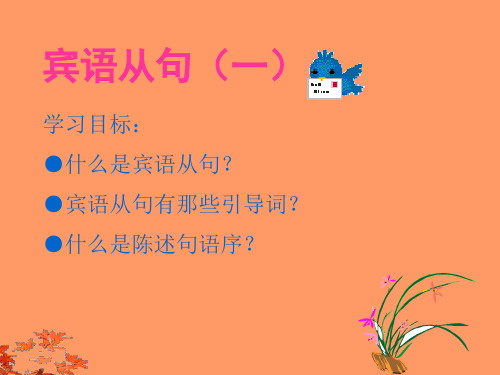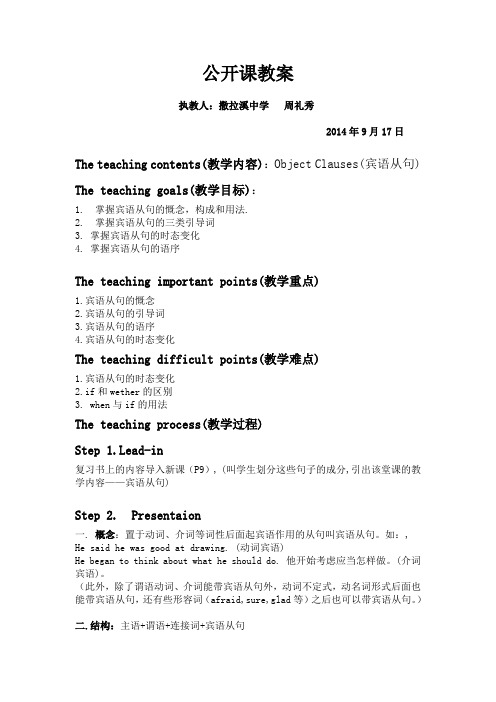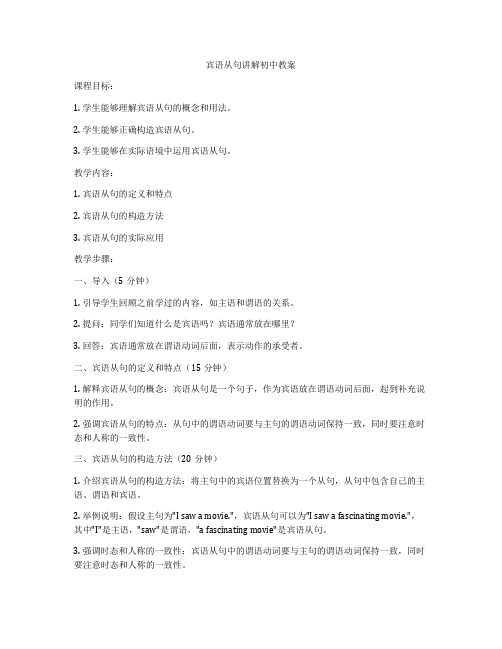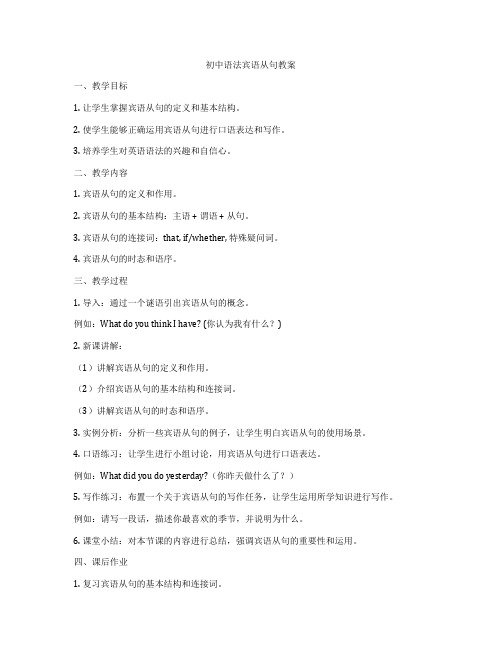宾语从句公开课教案
宾语从句(公开课)

is waiting for Do you know whom he ______ ______ _______?
4.我相信她会算出这道题。 work out I am sure she’ll _________ ________ this problem.
5.我想他还没有戒烟。 don’t _____ think he _____ has given up_____ smoking. I _____ ______ 6.我希望一切顺利。 everything goes I hope _________ __________ well 7. 我想他一定在教室里。 must be I think he _______ _______ in the classroom. 8. 她问你们什么时候出发。 when ________ you would________ start. She asked ________
that they will be back soon. hope _________________
I
that you’re much better today. see ___________________
陈述句作宾语从句,由that引导。从属连词that只起引导作 用,在从句中不作任何成分,常常被省略。
I
see
Байду номын сангаас
you.
You’re on foot today.
你能造宾语从句吗? 一、陈述句做宾语从句。
I
he is right. think that _________________ that she can do it well. hear __________________
初中英语宾语从句教学设计

篇一:宾语从句教案(初中英语样例)教学过程一、复习预习教师引导学生复习上节课所学的人称物主代词,不定代词和疑问代词的用法,(以提问、回顾的形式进行),针对上节课的作业进行讲评、订正、答疑,并通过对疑问代词具体用法的分析和扩展导入本节课所要学习的宾语从句。
二、知识讲解知识点1:宾语从句的连接词的用法在句子中起宾语作用的从句叫宾语从句。
常用的连接词有:that; if; whether; what; which; who; whom; when; where; how; why等。
1. 【考查点】宾语从句是陈述句时,用that引导。
在口语中that常被省略。
如:i know(that) you are a student.2. 【考查点】宾语从句是一般疑问句时,用if或whether来引导。
if, whether意为“是否”,whether还可以与or not连用。
如:lily wanted to know if her grandma liked the handbag.莉莉想知道她的姐姐是否喜欢这个手提袋。
3. 【考查点】宾语从句是特殊疑问句时,用疑问词引导。
如:he didn’t tell me where he was going. 他没告诉我他想去哪儿。
can you tell me what he said just now?你能告诉我他刚才说什么吗?知识点2:宾语从句的语序1. 陈述句变为宾语从句时,要注意人称和时态的变化,语序不变。
如: she said, “ i will leave a message on the desk.”她说她会在桌上留口信的。
she said that she would leave a message on the desk.2.【考查点】一般疑问句和特殊疑问句变为宾语从句时,也要注意人称和时态的变化,后面接陈述句语序。
如:“where are the tickets?” i asked him.我问他票在哪儿。
宾语从句公开课教案

公开课教案执教人:撒拉溪中学周礼秀2014年9月17日The teaching contents(教学内容):Object Clauses(宾语从句)The teaching goals(教学目标):1. 掌握宾语从句的慨念,构成和用法.2. 掌握宾语从句的三类引导词3. 掌握宾语从句的时态变化4. 掌握宾语从句的语序The teaching important points(教学重点)1.宾语从句的慨念2.宾语从句的引导词3.宾语从句的语序4.宾语从句的时态变化The teaching difficult points(教学难点)1.宾语从句的时态变化2.if和wether的区别3. when与if的用法The teaching process(教学过程)Step 1.Lead-in复习书上的内容导入新课(P9), (叫学生划分这些句子的成分,引出该堂课的教学内容——宾语从句)Step 2. Presentaion一.概念:置于动词、介词等词性后面起宾语作用的从句叫宾语从句。
如:, He said he was good at drawing. (动词宾语)He began to think about what he should do. 他开始考虑应当怎样做。
(介词宾语)。
(此外,除了谓语动词、介词能带宾语从句外,动词不定式,动名词形式后面也能带宾语从句,还有些形容词(afraid,sure,glad等)之后也可以带宾语从句。
)二.结构:主语+谓语+连接词+宾语从句三.种类:根据引词不同,宾语从句可分为三类。
1.由that引导的宾语从句。
如果宾语从句是由陈述句充当,用that引导,that 无词义,在口语或非正式文体中常省略。
如:The teacher said (that) he is a good student .The teacher said (that )the earth goes round the sun.。
宾语从句讲解初中教案

宾语从句讲解初中教案课程目标:1. 学生能够理解宾语从句的概念和用法。
2. 学生能够正确构造宾语从句。
3. 学生能够在实际语境中运用宾语从句。
教学内容:1. 宾语从句的定义和特点2. 宾语从句的构造方法3. 宾语从句的实际应用教学步骤:一、导入(5分钟)1. 引导学生回顾之前学过的内容,如主语和谓语的关系。
2. 提问:同学们知道什么是宾语吗?宾语通常放在哪里?3. 回答:宾语通常放在谓语动词后面,表示动作的承受者。
二、宾语从句的定义和特点(15分钟)1. 解释宾语从句的概念:宾语从句是一个句子,作为宾语放在谓语动词后面,起到补充说明的作用。
2. 强调宾语从句的特点:从句中的谓语动词要与主句的谓语动词保持一致,同时要注意时态和人称的一致性。
三、宾语从句的构造方法(20分钟)1. 介绍宾语从句的构造方法:将主句中的宾语位置替换为一个从句,从句中包含自己的主语、谓语和宾语。
2. 举例说明:假设主句为"I saw a movie.",宾语从句可以为"I saw a fascinating movie.",其中"I"是主语,"saw"是谓语,"a fascinating movie"是宾语从句。
3. 强调时态和人称的一致性:宾语从句中的谓语动词要与主句的谓语动词保持一致,同时要注意时态和人称的一致性。
四、宾语从句的实际应用(15分钟)1. 提问:同学们能否举例说明宾语从句在日常生活中的应用?2. 引导学生思考并回答:例如,当我们询问别人正在做什么时,他们可能会回答"I am reading a book.",这里的"I am reading a book"就是一个宾语从句,作为回答补充说明正在做的事情。
3. 举例展示:给出一些实际语境,如对话、故事等,让学生理解宾语从句在实际语境中的运用。
我初中宾语从句教案

我初中宾语从句教案1. 知识目标(1)使学生掌握宾语从句的定义、用法和语序。
(2)培养学生运用宾语从句进行交际的能力。
2. 能力目标(1)能够正确地判断和运用宾语从句。
(2)能够熟练地运用宾语从句进行日常交际。
3. 情感目标激发学生学习英语的兴趣,培养积极向上的学习态度。
二、教学内容1. 宾语从句的定义和用法宾语从句是一种句子成分,它在句子中作宾语。
宾语从句通常由连接词(如:that, if, whether, who, what, where, when, why, how等)引导,遵循陈述句语序。
2. 宾语从句的语序宾语从句的语序是陈述句语序,即主语+谓语+宾语。
例如:“What he said is true.”(他说的是真的。
)3. 宾语从句的连接词宾语从句的连接词有多种,常见的有:(1)that:只起连接作用,无词义。
例如:“I know that he is busy.”(我知道他很忙。
)(2)if/whether:表示条件或选择。
例如:“Please let me know if you need any help.”(请告诉我如果你需要任何帮助。
)(3)who/whom/whose:表示人及其关系。
例如:“Please pass the book to whoever needs it.”(请把书递给需要的人。
)(4)what:表示事物。
例如:“She wants to know what we are doing.”(她想知道我们在做什么。
)(5)where/when:表示地点和时间。
例如:“I don't know where he lives.”(我不知道他住在哪里。
)(6)why:表示原因。
例如:“He didn't tell me why he was late.”(他没有告诉我他为什么迟到。
)(7)how:表示方式或程度。
例如:“I can't imagine how he managed to do it.”(我无法想象他是如何做到的。
初中语法宾语从句教案

初中语法宾语从句教案一、教学目标1. 让学生掌握宾语从句的定义和基本结构。
2. 使学生能够正确运用宾语从句进行口语表达和写作。
3. 培养学生对英语语法的兴趣和自信心。
二、教学内容1. 宾语从句的定义和作用。
2. 宾语从句的基本结构:主语 + 谓语 + 从句。
3. 宾语从句的连接词:that, if/whether, 特殊疑问词。
4. 宾语从句的时态和语序。
三、教学过程1. 导入:通过一个谜语引出宾语从句的概念。
例如:What do you think I have? (你认为我有什么?)2. 新课讲解:(1)讲解宾语从句的定义和作用。
(2)介绍宾语从句的基本结构和连接词。
(3)讲解宾语从句的时态和语序。
3. 实例分析:分析一些宾语从句的例子,让学生明白宾语从句的使用场景。
4. 口语练习:让学生进行小组讨论,用宾语从句进行口语表达。
例如:What did you do yesterday?(你昨天做什么了?)5. 写作练习:布置一个关于宾语从句的写作任务,让学生运用所学知识进行写作。
例如:请写一段话,描述你最喜欢的季节,并说明为什么。
6. 课堂小结:对本节课的内容进行总结,强调宾语从句的重要性和运用。
四、课后作业1. 复习宾语从句的基本结构和连接词。
2. 完成一个关于宾语从句的练习题。
3. 准备一个关于宾语从句的口头报告。
五、教学评价1. 课堂参与度:观察学生在课堂上的积极参与情况和提问回答。
2. 口语表达:评估学生在口语练习中的表现,是否能正确使用宾语从句。
3. 写作能力:评价学生在写作练习中的表现,是否能正确运用宾语从句。
通过以上教学设计,希望能帮助学生更好地理解和掌握宾语从句,提高他们的英语语法水平。
宾语从句教案模板及范文
一、教学目标1. 知识目标:理解宾语从句的概念、构成和用法。
2. 能力目标:掌握宾语从句的引导词、语序和否定形式。
3. 情感目标:提高学生对英语语法学习的兴趣,培养学生的英语思维。
二、教学重点1. 宾语从句的概念和构成。
2. 宾语从句的引导词和语序。
3. 宾语从句的否定形式。
三、教学难点1. 宾语从句引导词的选用。
2. 宾语从句的语序和时态。
3. 宾语从句在句子中的运用。
四、教学过程(一)导入1. 引导学生回顾已学知识,如主语从句、表语从句等。
2. 提出问题:什么是宾语从句?它有什么特点?(二)新课讲解1. 宾语从句的概念:宾语从句是作为动词、形容词或介词的宾语成分的从句。
2. 宾语从句的构成:由从属连词(如that、whether、if等)引导,从句成分完整。
3. 宾语从句的引导词:a. that引导宾语从句时,只起连接作用,不充当从句成分。
b. whether和if引导宾语从句时,意为“是否”,表示选择关系。
c. 其他引导词:when、where、why、how等。
4. 宾语从句的语序:与主句保持一致,即陈述语序。
5. 宾语从句的否定形式:在从句中使用否定词(如not、never等)。
(三)课堂练习1. 完成练习题,巩固宾语从句的用法。
2. 小组讨论,互相纠正错误。
(四)课堂小结1. 总结宾语从句的概念、构成和用法。
2. 强调宾语从句在句子中的重要作用。
(五)课后作业1. 复习本节课所学内容。
2. 完成课后练习题。
五、教学反思1. 本节课通过讲解、练习、讨论等多种方式,帮助学生掌握宾语从句的用法。
2. 在教学过程中,关注学生的个体差异,因材施教。
3. 鼓励学生在课后多练习,提高英语语法水平。
范文:一、教学目标1. 知识目标:理解宾语从句的概念、构成和用法。
2. 能力目标:掌握宾语从句的引导词、语序和否定形式。
3. 情感目标:提高学生对英语语法学习的兴趣,培养学生的英语思维。
二、教学重点1. 宾语从句的概念和构成。
初中英语宾语从句公开课教案(优秀版)word资料
初中英语宾语从句公开课教案(优秀版)word资料课题:The Revise of the Object ClauseTeaching planTeacher :Teaching time: March 13th, 2020Teaching place:Chihe Middle SchoolClass1, Grade9Teaching contents: Object clauseTeaching type: GrammarI. Teaching AimsA. Aims of KnowledgeBy the end of the lesson, Ss will have a better understanding of the object clause.Then Ss will grasp the usage of 3 introductory words: that、if、whether,the tense and word order, etc.B. Aims of AbilityEnable students to identify what is the object clause and learn to use different kinds of introductory wordsC. Aims of EmotionDevelop students’ interest of learning grammar.II. Teaching important pointsExplain the three important aspects of the objective clause: the introductory words, tense and sentence order. Besides, explain the usage of 3 introductory words:that, if, whether..III.Teaching difficult pointsHow to choose the introductory words correctly and appropriately in theobjective clauseIV. Teaching methodsCombine the inductive method with the deductive method.V. Teaching aidstextbook, multimedia and chalksVI. Teaching proceduresStep 1 Warm upPlay a song of Backstreet .Listen to the lyrics carefully and then fill in the blanksStep 2 Lead inPlay a game “whisper”T: I’ll give the first one of each group a piece of paper. Remember the sentence on the paper and pass on the message to the one behind you. Then report what you heard.Step 3 Presentation1. Talk about the following sentences in groups of four. Think about what we should pay attention to object clause: 语序、时态、引导词。
初中宾语从句专讲教案
教案:初中宾语从句专讲教学目标:1. 学生能够理解宾语从句的定义和作用。
2. 学生能够掌握引导宾语从句的连词和连接代词。
3. 学生能够掌握宾语从句的语序和时态呼应。
4. 学生能够运用宾语从句进行实际的语言运用。
教学内容:1. 宾语从句的定义和作用。
2. 引导宾语从句的连词和连接代词。
3. 宾语从句的语序和时态呼应。
4. 宾语从句的实际语言运用。
教学步骤:一、导入(5分钟)1. 向学生介绍宾语从句的概念。
2. 通过示例句子让学生理解宾语从句的作用。
二、讲解宾语从句的定义和作用(10分钟)1. 解释宾语从句是在复合句中充当宾语的从句。
2. 强调宾语从句的作用是作为动词、介词或形容词的宾语。
三、讲解引导宾语从句的连词和连接代词(10分钟)1. 介绍连词that(可省略)、whether/if、连接代词who、what、which、whom、whose以及连接副词when、where、why、how等。
2. 通过示例句子展示不同连词和连接代词的用法。
四、讲解宾语从句的语序和时态呼应(10分钟)1. 强调宾语从句的语序必须是陈述语序,即主语+谓语+宾语。
2. 解释主句与宾语从句在时态上的呼应关系,如主句为一般现在时,宾语从句通常也为一般现在时。
五、宾语从句的实际语言运用(10分钟)1. 提供一些练习句子,让学生运用宾语从句进行填空练习。
2. 让学生进行小组讨论,用宾语从句完成对话。
六、总结和复习(5分钟)1. 对本节课的内容进行总结,强调宾语从句的定义、引导词的用法、语序和时态呼应。
2. 提醒学生宾语从句在实际语言运用中的重要性。
教学评估:1. 通过课堂练习和小组讨论,观察学生对宾语从句的理解和运用情况。
2. 在课后作业中加入宾语从句的练习,以巩固所学知识。
教学延伸:1. 进一步讲解宾语从句的复杂句型,如宾语从句中嵌套宾语从句。
2. 结合其他语法点,如情态动词、被动语态等,进行综合语言运用。
以上是针对初中宾语从句专讲的教学教案,通过讲解宾语从句的定义、引导词的用法、语序和时态呼应,以及实际语言运用,帮助学生全面掌握宾语从句的知识。
初中教案宾语从句
初中教案宾语从句一、教学目标:1. 让学生理解宾语从句的概念和用法。
2. 使学生能够正确地运用宾语从句表达句子的意思。
3. 培养学生的英语思维能力和口语表达能力。
二、教学内容:1. 宾语从句的定义和基本结构。
2. 宾语从句的时态和语序。
3. 宾语从句在实际语境中的应用。
三、教学重点与难点:1. 宾语从句的时态和语序。
2. 宾语从句在实际语境中的应用。
四、教学方法:1. 情境教学法:通过设定各种实际情境,让学生在实践中理解和运用宾语从句。
2. 互动教学法:引导学生积极参与课堂讨论,提高学生的口语表达能力。
3. 任务型教学法:设计各种任务,让学生在完成任务的过程中运用宾语从句。
五、教学步骤:1. 引入新课:通过一个谜语,引导学生思考宾语从句的概念。
例如:Who is the smartest person in the class?(班上谁最聪明?)2. 讲解宾语从句:讲解宾语从句的定义、基本结构和用法。
宾语从句:在复合句中,作为宾语的从句。
基本结构:连接词+主语+谓语+其他。
例如:What did you say?(你说什么?)3. 宾语从句的时态和语序:讲解宾语从句的时态和语序。
时态:一般用陈述句的语序,特殊情况下可用疑问句语序。
例如:What did you do yesterday?(你昨天做什么了?)语序:陈述句语序(S+V+O)或疑问句语序(O+V+S)。
例如:Where is the library?(图书馆在哪里?)4. 实例分析:分析一些宾语从句的实例,让学生更好地理解宾语从句的用法。
例如:(1)I don't know when the party will start.(我不知道聚会什么时候开始。
)(2)Can you tell me where the post office is?(你能告诉我邮局在哪里吗?)5. 练习与互动:设计一些练习题,让学生在课堂上进行互动练习。
- 1、下载文档前请自行甄别文档内容的完整性,平台不提供额外的编辑、内容补充、找答案等附加服务。
- 2、"仅部分预览"的文档,不可在线预览部分如存在完整性等问题,可反馈申请退款(可完整预览的文档不适用该条件!)。
- 3、如文档侵犯您的权益,请联系客服反馈,我们会尽快为您处理(人工客服工作时间:9:00-18:30)。
公开课教案执教人:撒拉溪中学周礼秀2014年 9 月 17日The teaching contents(教学内容):Object Clauses(宾语从句)The teaching goals(教学目标):1.掌握宾语从句的慨念,构成和用法 .2.掌握宾语从句的三类引导词3.掌握宾语从句的时态变化4.掌握宾语从句的语序The teaching important points(教学重点)1.宾语从句的慨念2.宾语从句的引导词3.宾语从句的语序4.宾语从句的时态变化The teaching difficult points(教学难点)1.宾语从句的时态变化2.if 和 wether 的区别3.when 与 if 的用法The teaching process(教学过程)Step 1.Lead-in复习书上的内容导入新课( P9), ( 叫学生划分这些句子的成分 , 引出该堂课的教学内容——宾语从句 )Step 2. Presentaion一 .概念:置于动词、介词等词性后面起宾语作用的从句叫宾语从句。
如:,He said he was good at drawing. (动词宾语)He began to think about what he should do.他开始考虑应当怎样做。
( 介词宾语)。
(此外,除了谓语动词、介词能带宾语从句外,动词不定式,动名词形式后面也能带宾语从句,还有些形容词(afraid,sure,glad等)之后也可以带宾语从句。
)二 . 结构:主语 +谓语 +连接词 +宾语从句三 . 种类:根据引词不同,宾语从句可分为三类。
1.由 that 引导的宾语从句。
如果宾语从句是由陈述句充当,用 that 引导,that 无词义,在口语或非正式文体中常省略。
如:The teacher said (that) he is a good student .The teacher said (that )the earth goes round the sun.。
The teacher said (that) light travels much faster than sound.( 举此例是为下面讲时态作铺垫)2.由 if 或 whether 引导的当宾语从句。
如果宾语从句是由一般疑问句充当,就用 if或whether引导,意为“是否” 。
如:I don't know if/whether it will rain today。
在宾语从句中, if和 whether 通常可以互换,但在下列情况下只能用whether :①在具有选择意义,尤其是直接与or not 连用时,往往用 whether (if,or not 也可以使用)。
如:I don't know whether or not it will rain today 。
(=I don't know if it will rain or not today。
②在介词之后用 whether 。
如:I ’m thingking about whether it will rain today.③若用 if 会引起歧义时,则用 whether 。
如:Please let me know if it will rain today.可理解为:a.Please let me know whether it will rain today.请告诉我今天会不会下雨。
b.If it will rain today.,please let me know.如果今天会下雨,请告诉我。
④ whether 置于句首时,不能换用 if。
如:Whether it will rain or not today,Ican't say.今天会不会下雨,我说不上来。
⑤引导主语从句和表语从句时宜用whether 。
如:Whether it will rain or not today is still a question.今天会不会下雨还是个问题。
The question is whether it will rain or not today.问题是今天会不会下雨。
⑥在不定式前用 whether 。
如:I haven’t decided whether to go to Beijing in National Day.(= I haven’t decided to whether/if I would go to Beijing in National Day.3.由特殊疑问词引导的宾语从句。
如果宾语从句是特殊疑问句,只需用原来的特殊疑问词引导。
如:I want to know how you studied English before.I want to know why he didn’ t come yesterday.I want to know where he will go tomorrow.I want to know what you are doing now.I want to know what you were doing this time yesterday.I want to know when you go to school in the morning.She wanted to know how you studied English before.She wanted to know why he didn’t come yesterday.She wanted to know where he would go tomorrow.She wanted to know what you were doing then.She wanted to know what you were doing this time yesterday.She wanted to know when you go to school in the morning.She wanted to know what your names are.注意: if 和 when既可以引导宾语从句,也可以引导状语从句,应注意它们在两种从句中的意思和用法的不同。
if 和 when引导宾语从句时,分别意为“是否”和“何时”,其时态应和主句时态相呼应;它们引导状语从句时,意思分别为“如果,假如”和“当 ,, 时候”,当主句时态是一般将来时时,其时态用一般现在时。
因此,遇到它们就要认真分析一下,它们究竟是引导什么从句。
如:If it rains tomorrow, I won’t come.(时间状语从句)I don ’t know if it will rain tomorrow.(宾语从句)I want to know when you go to school in the morning.(宾语从句)When you go to school,please tell me.(时间状语从句)4.归纳总结:①当宾语从句是由陈述句充时,用 that 引导;②当宾语从句是由一般疑问句充当时,用if或whether引导;③如果宾语从句是特殊疑问句,只需用原来的特殊疑问词引导。
四. 时态(一致性原则)引导学生从所举例子当中归纳总结得出:含宾语从句的复合句,主、从句谓语动词的时态呼应应包括以下三点内容:1)如果主句的谓语动词是一般现在时,从句的谓语动词可根据需要,选用相应的任何时态。
2)如果主句的谓语动词是过去时,宾语从句的谓语动词要根据需要,选用过去(即一般过去时、过去进行时、过去将来时或过去完成时)的某一种形式。
( 详见下表 )从句时态主句时态连接前连接后一般现在时时态保持不变一般现在时一般过去时一般过去时一般过去时一般过去时一般将来时过去将来时现在进行时过去进行时现在完成时过去完成时3)如果宾语从句所表示的是客观事实、普遍真理、自然现象或习惯性动作等,不管主句用什么时态,从句时态都用一般现在时。
如:五 . 语序:陈述句语序。
( 引导学生从例子中归纳总结得出)六. 宾语从句的否定转移。
当主句的谓语动词为think, guess, suppose, believe等,且主语为第一人称时,从句若表示否定,一般将否定词not 转移到主句的谓语中,这就叫作“否定转移”。
如:“我认为他不是一个好学生”这句话不能说成I think(that)he is not a good student.而是要说成I don't think(that)he is a good student.但是如果动词为非一般现在时或主语不是第一人称时,否定不转移。
如:She thinks (that )he is not a good student.I thought ( that) he is not a good student..七.从句的简化1.当主句谓语动词是 find ,see,watch ,hear 等感官动词时,从句常简化为“宾语+宾补”结构,宾补为不带to 的不定式或 V-ing 形式。
如:She found that the wallet was lying on the ground.→She found the wallet lying on the ground.2.当主句谓语动词是 hope,wish ,decide ,forget , plan ,agree 等,且主句主语与从句主语相同时,从句可简化为不定式结构。
如:She agreed that she c ould help me with my maths. →She agreed to help me with my maths.3.在连接代词 / 副词引导的宾语从句中,当从句主语与主句主语或间接宾语一致时,宾语从句可简化为“连接代词 / 副词+不定式”结构。
如:Can you tell me how I can get to the station?→Can you tel l me how to get to the station?八. 人称的变化和标点的使用 ( 八年级学直接引语转化成间接引语时讲过,这里不重点讲,只作简单的复习 )1.从句的主语如果是第一人称,变为宾语从句则与主句的主语一致;如果是第二人称,则与主句的宾语一致;如果是第三人称,不用变化。
如:“May I use your knife? ” He asked me. →He asked me if he might use my knife.“Do you know her telephone number?” He asked me.→He asked me if I know her telephone number.2.宾语从句的标点均由主句决定。
